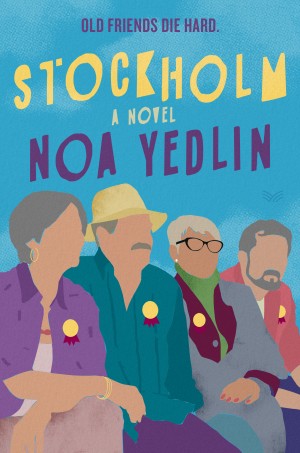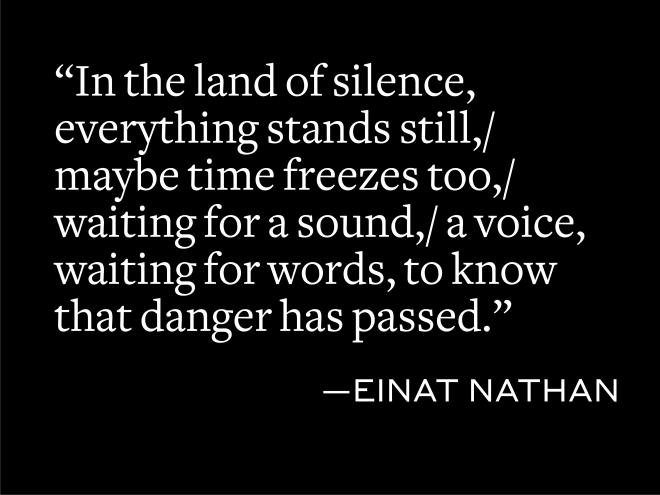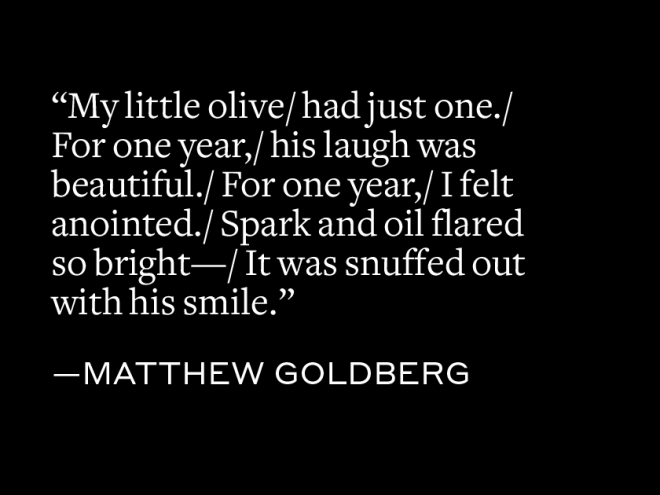
This piece is one of an ongoing series that we will be sharing in the coming days from Israeli authors and authors in Israel.
It is critical to understand history not just through the books that will be written later, but also through the first-hand testimonies and real-time accounting of events as they occur. At Jewish Book Council, we understand the value of these written testimonials and of sharing these individual experiences. It’s more important now than ever to give space to these voices and narratives.
In collaboration with the Jewish Book Council, JBI is recording writers’ first-hand accounts, as shared with and published by JBC, to increase the accessibility of these accounts for individuals who are blind, have low vision or are print disabled.
The subtitle at the bottom of the screen announces: At least 900 murdered, over 2,700 injured. It’s a permanent announcement, glued to the screen. Above it, the pictures keep changing: A woman with her one-month-old baby, who hid in a storage room with no food or water for twenty-seven hours, her husband nowhere to be found; a man sobbing, his two daughters kidnapped and taken the Gaza strip; text messages written by a ten year old girl who watched her father get slaughtered, and is writing to her mother who is trying to keep her calm, telling her not to look at her father’s body while she’s searching for a bottle of water.
But the subtitle is persistent, it accompanies them all. The problem is, I am lying to my children: I am telling them that everything is going to be ok. Whenever one of them peeks out of their room, we immediately switch channels. We have the documentary channel on call. We also have a face on call; it’s the one that says, we haven’t been crying. My daughter comes into the living room, the screen is filled with pink sharks and rare eels. This is what you’re watching? She wonders. We nod, voices — as we learned over the past forty-eight hours — are not trustworthy. She takes something out of the refrigerator and we become impatient — how long does it take to wash a fucking apple — as if our eyes watching the horror will somehow be missed. She finally goes back to her room; we switch back to the news. The subtitle went nowhere, but the number was updated: now it’s at least 1,000 murdered. I remember, on Saturday, when it said, “At least 22 murdered in the Gaza Envelope.” No, we thought then, this can’t be true.
______
The civil initiatives that have filled the country over the past few days and swept hundreds of thousands of people are a sight to be seen. Improvised stations were set up at major streets and schools, where thousands of volunteers are sorting through and packing the astonishing amount of donations brought in and sending them off (by private cars of private citizens) to the hospitals, army bases, and families who were evacuated from hell with no clothes, diapers, or food. Everybody participates: some open their houses to the Gaza Envelope refugees, others cook and bring the food to the distribution centers, some offer their professional skills as therapists, dentists, or babysitters for free. The ones who can’t leave their houses donate money. The WhatsApp groups are burning with messages: clean underwear and flashlights are needed for soldiers in the south; is anyone available to pick up a delivery of food from Haifa? Baby equipment needed for three-month-old twins, now orphaned.
It warms the heart, but at the same time, it breaks it. The Israeli people are filling the void created by a non-functioning nightmare of a government, who for the past ten months based its decisions on the needs of its members, while systematically weakening — if not crushing — the army, the welfare system, and other public services, all while concentrating its efforts in breaking Israel’s democracy. The facts are no secret: Benjamin Netanyahu has been warned, time and time again, by army high rank officials, that the Judicial Coup weakens the Israeli army by the day, that a disaster is on the horizon — to no avail. When defense minister Yoav Galant warned of a catastrophe, Netanyahu’s response was to fire him (and later reversed his decision, after hundreds of thousands of protestors flooded the streets). The inhabitants of the Gaza Envelope were abandoned by a government busy securing the well-being of MP Zvi Sukkot, who felt the need to celebrate the Jewish holidays in the Palestinian village Huwara, as well as other extremists among the settlers, who will forever prefer the past — often an imaginary one — over the future.
The sad truth is out there: it is broadcasted 24/7, live on TV. No one in Israel will ever forget the long hours of watching TV reporters – their eyes wet with tears and their voices broken with frustration – read out loud text messages sent to them by people besieged in locked rooms begging for help – from the police, from the army, from anyone – while the Hamas terrorists tried to break down their doors. Some of them were locked there for over twelve hours before being rescued, often thanks to the reporters, directing the soldiers to their locations. Many others were murdered.
______
There will be time for bringing those responsible for this calamity to justice. This will probably be the beginning of a new Israel, hopefully a better, saner one. Right now, there are over 130 people held captive by Hamas, many of them are small children, even babies, young and elderly women. My hairdresser’s mother, eighty-five years old, is now there. Hamas kidnapped them all in what can only be described as an inhumane war crime. The Israeli government, with the help of the sane world, headed by the United States, should free them now, at any cost, within a matter of days, before it is too late. Any other outcome will be unforgivable in the eyes of the Israeli people, who are done forgiving.
The views and opinions expressed above are those of the author, based on their observations and experiences.
Support the work of Jewish Book Council and become a member today.
Noa Yedlin is a bestselling and award-winning Israeli author. She is the recipient of the Sapir Prize (the Israeli Man Booker) and the Prime Minister’s Literature Award and author of the bestselling House Arrest, Stockholm, People Like Us, and The Wrong Book. She created the television series Stockholm based on her bestselling novel of the same name.



